人教版(2019)必修 第二册Unit4 History and traditions Reading and Thinking课件(共49张PPT)
文档属性
| 名称 | 人教版(2019)必修 第二册Unit4 History and traditions Reading and Thinking课件(共49张PPT) |
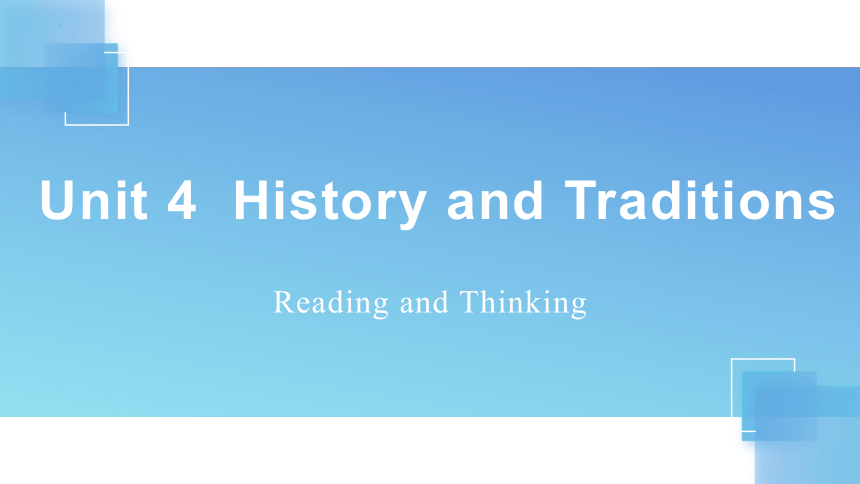
|
|
| 格式 | pptx | ||
| 文件大小 | 4.2MB | ||
| 资源类型 | 教案 | ||
| 版本资源 | 人教版(2019) | ||
| 科目 | 英语 | ||
| 更新时间 | 2023-03-06 00:00:00 | ||
图片预览


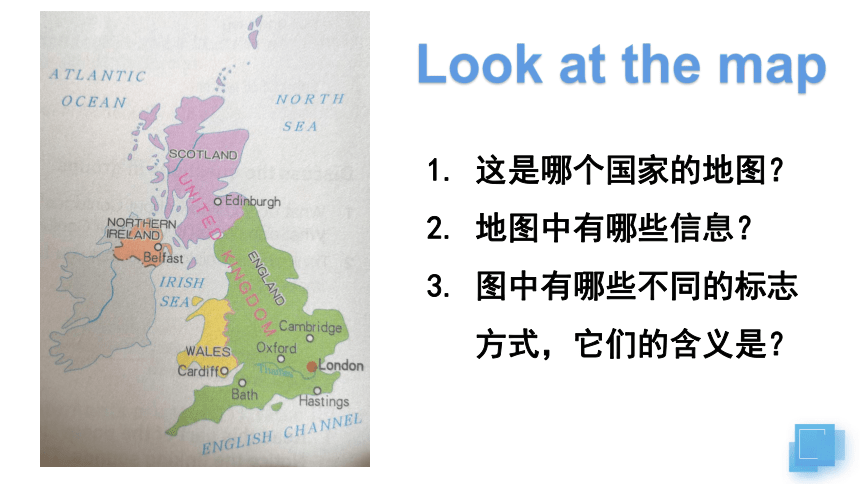
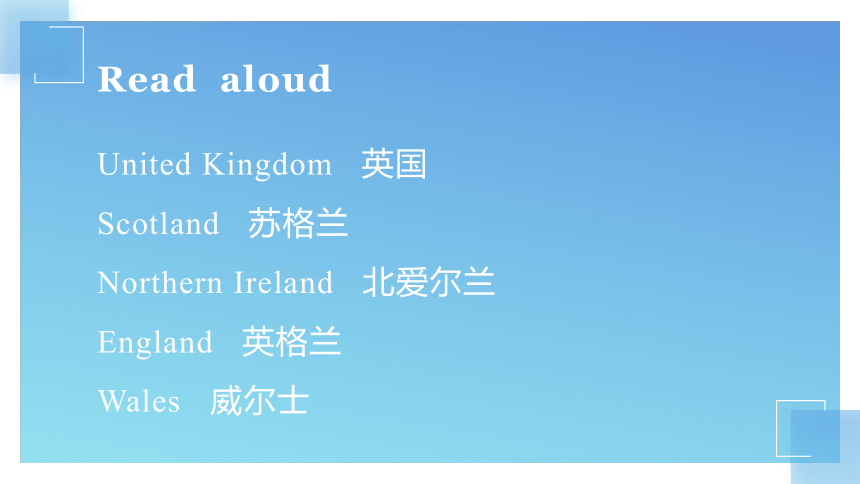
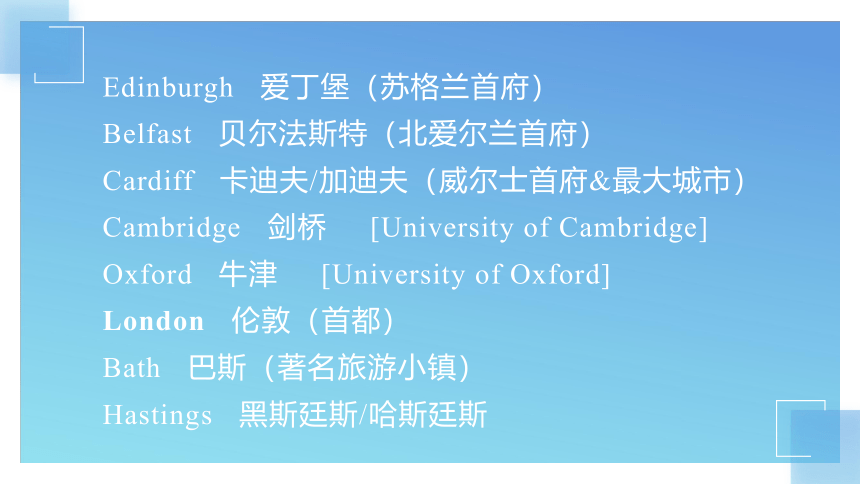
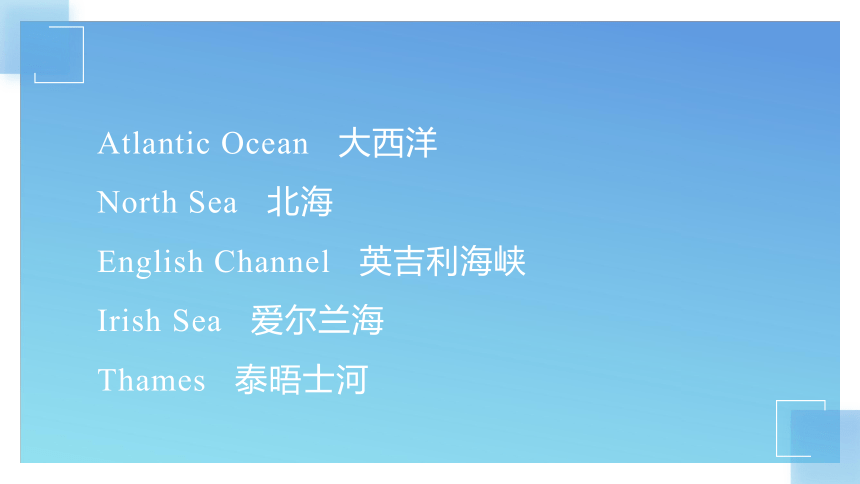
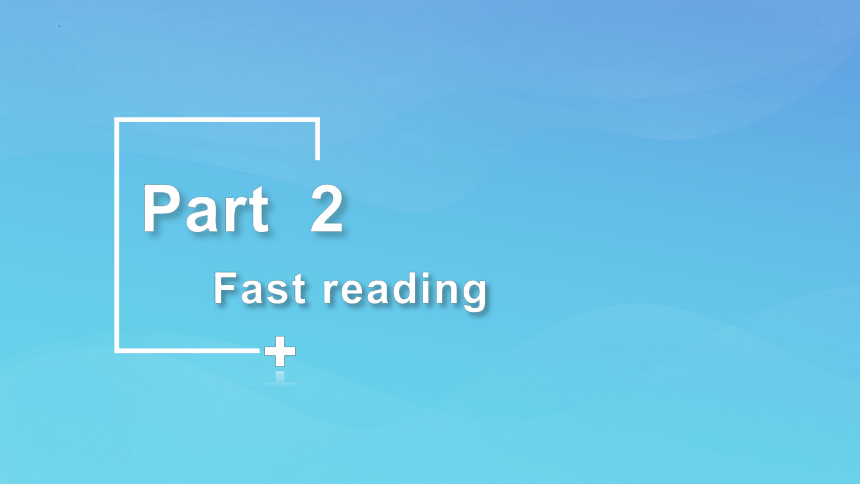
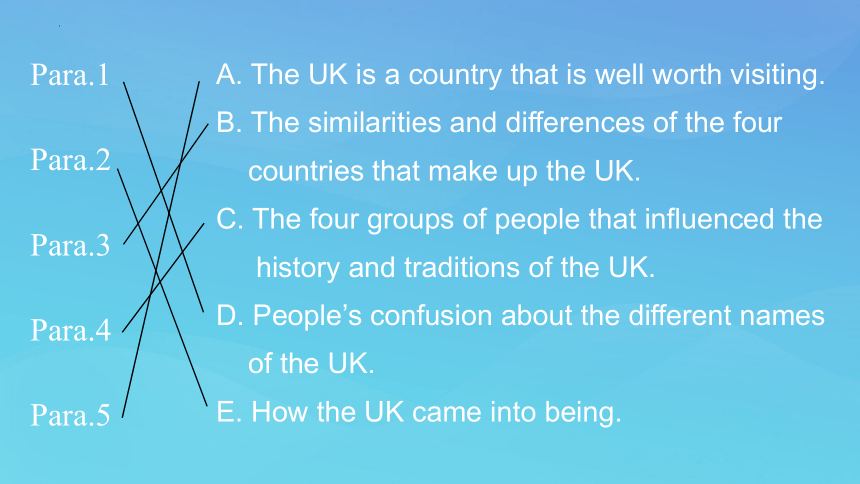
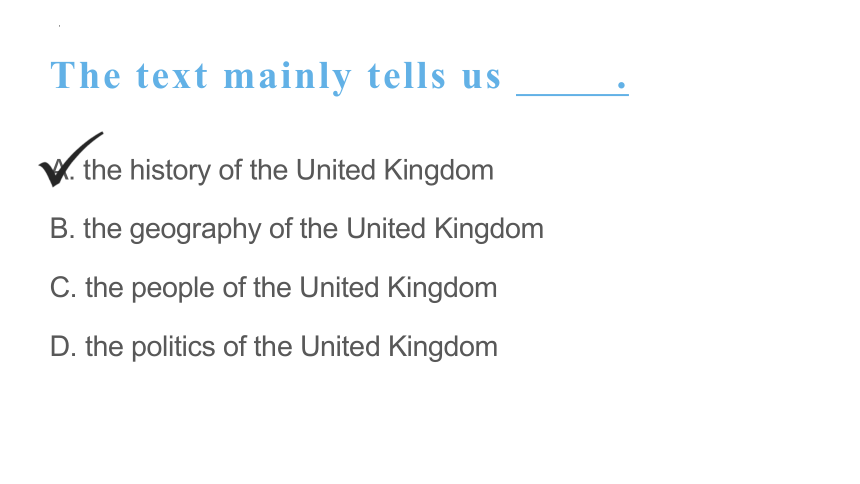
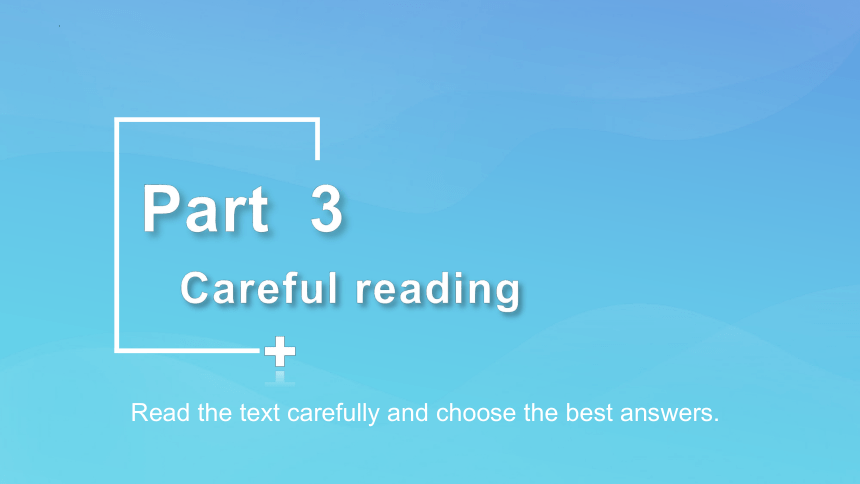
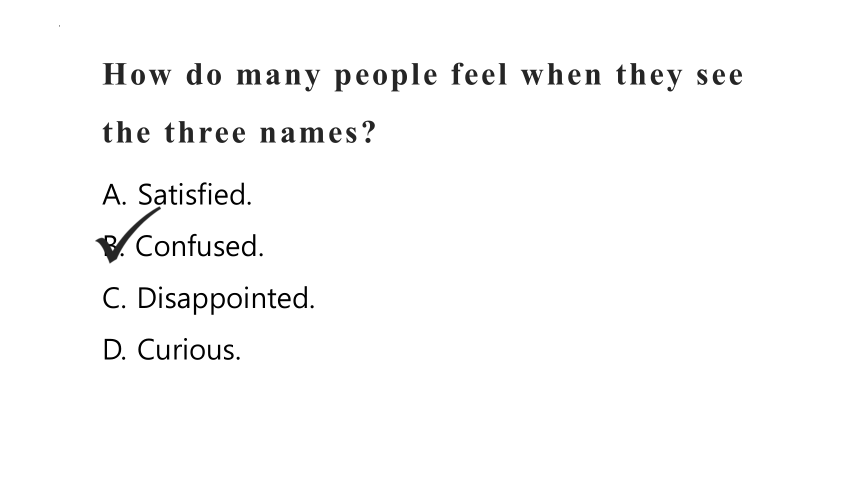
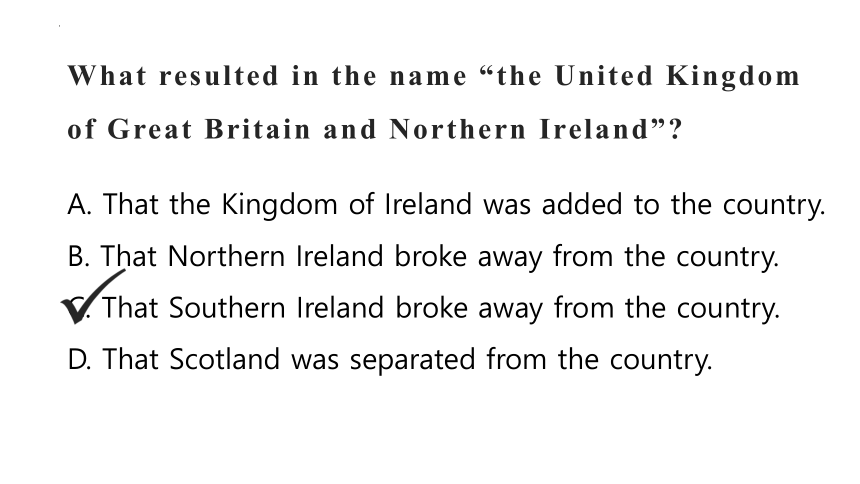
文档简介
(共49张PPT)
Unit 4 History and Traditions
Reading and Thinking
Part 1
Lead-in
Look at the map
1. 这是哪个国家的地图?
2. 地图中有哪些信息?
3. 图中有哪些不同的标志
方式,它们的含义是?
Read aloud
United Kingdom 英国
Scotland 苏格兰
Northern Ireland 北爱尔兰
England 英格兰
Wales 威尔士
Edinburgh 爱丁堡(苏格兰首府)
Belfast 贝尔法斯特(北爱尔兰首府)
Cardiff 卡迪夫/加迪夫(威尔士首府&最大城市)
Cambridge 剑桥 [University of Cambridge]
Oxford 牛津 [University of Oxford]
London 伦敦(首都)
Bath 巴斯(著名旅游小镇)
Hastings 黑斯廷斯/哈斯廷斯
Atlantic Ocean 大西洋
North Sea 北海
English Channel 英吉利海峡
Irish Sea 爱尔兰海
Thames 泰晤士河
Part 2
Fast reading
Para.1
Para.2
Para.3
Para.4
Para.5
A. The UK is a country that is well worth visiting.
B. The similarities and differences of the four
countries that make up the UK.
C. The four groups of people that influenced the
history and traditions of the UK.
D. People’s confusion about the different names
of the UK.
E. How the UK came into being.
A. the history of the United Kingdom
B. the geography of the United Kingdom
C. the people of the United Kingdom
D. the politics of the United Kingdom
The text mainly tells us .
Part 3
Careful reading
Read the text carefully and choose the best answers.
How do many people feel when they see the three names
A. Satisfied.
B. Confused.
C. Disappointed.
D. Curious.
What resulted in the name “the United Kingdom of Great Britain and Northern Ireland”
A. That the Kingdom of Ireland was added to the country.
B. That Northern Ireland broke away from the country.
C. That Southern Ireland broke away from the country.
D. That Scotland was separated from the country.
What did the Anglo-Saxons do when they arrived in the country
A. They built wonderful towns and roads.
B. They made the way people built houses changed.
C. They left behind lots of new vocabulary.
D. They had castles built all around England.
Why does the English language have so many French words
A. Because of the influence of the Romans.
B. Because of the influence of the Anglo-Saxons.
C. Because of the influence of the Vikings.
D. Because of the influence of the Normans.
What’s the author’s attitude towards studying the history
A. Neutral.
B. Indifferent.
C. Supportive.
D. Doubtful.
Part 4
Language points
— many people are confused by what these different names mean.
— many people are confused by what these different names mean.
连接代词 what 引导宾语从句,并在从句中作mean的宾语。
— many people are confused by what these different names mean.
be/feel/get confused (by/about sth.)
对……感到疑惑;被……弄糊涂了
confusing adj.令人困惑的
confuse…with/and… 把……与……混淆
(look at sb.) in confusion 迷惑地(看着……)
本句中 “if any” 是省略句, 完整句子是: “if there is any diference ” 意为“如果有任何区别的话”。
So what is the difference between them, if any
【拓展】
if ever 如果有过的话
if so 如果这样的话
if not 如果不这样的话
if necessary 如果有必要的话
if possible 如果有可能的话
So what is the difference between them, if any
Getting to know a little bit about British history will help you solve this puzzle.
“Getting to know a little bit about British history” 是动名词短语作主语。
动名词作主语的几种情况
①动名词直接置于句首
Having a trip there will give you a good understanding of Chinese culture.
去那旅行会让你对中国文化有更好的了解。
动名词作主语的几种情况
②V-ing形式作主语,有时可后置,用it作形式主语
It is no use crying over spilt milk.
覆水难收。
动名词作主语的几种情况
③There be 结构中作主语
There is no saying when he'll come.
很难说他何时回来。
动名词作主语的几种情况
④动名词的复合结构作主语
当动名词有自己的逻辑主语时,可以在前面加上所有格名词或物主代词,构成动名词的复合结构。动名词的复合结构也可以在句中作主语。
Their coming to help was a great encouragement to us.
动名词(短语)作主语,谓语动词用单数形式。
Watching TV too much is bad for your eyes.
看电视太多对你的眼睛不好。
Talking is easier than doing.
说比做容易多了。
用不定式作主语的常见情况(句型)
① It is necessary / important / impossible / difficult...
(for sb.) to do sth. (某人)做某事是……的
It is necessary for us to master a foreign language.
② It is kind / foolish / clever / stupid / nice / rude /
careless / friendly ...(of sb.) to do sth.
It is very kind of you to help us.
有何区别?
用不定式作主语的常见情况(句型)
③It takes sb. sth. to do sth. 某人做某事花费了……
It took me two hours to finish the work.
④不定式和when/where/how/what/whether等连用,在句
子中作主语
How to solve the problem is still being discussed.
Where to put the box seems hard to decide.
1. (play) basketball was his dream.
2. Her (lose) her new bike really made her
mother very upset.
3. It took him a long time (acquire) the skills.
4. There is no (tell) how many miles you will
have to run while chasing a dream.
5. How (use) the computer is a question.
losing
Playing
to acquire
telling
to use
6. It was careless him (make) such a
mistake.
7. Working with so selfish a person (be) a terrible
thing.
8. It is necessary us (form) a good habit
when we’re young.
9. It is a waste of time (persuade) such a
person to join us.
10. Whether (do) it hasn't been decided.
of
to make
is
for
to form
persuading
to do
Getting to know a little bit about British history will help you solve this puzzle.
n. 谜;难题
① I am in a puzzle about getting along with my new
classmates.
② Their reason for doing it is still a puzzle to me.
(sb.) be in a puzzle 感到困惑;不知如何是好
(sth.) be a puzzle to sb. ······对某人来说是个谜
Getting to know a little bit about British history will help you solve this puzzle.
vt. 迷惑,使困惑
① Karen puzzled over the question all evening.
② He was trying to puzzle out why he had been
brought to the house.
puzzle over/about 仔细琢磨;冥思苦想
puzzle out 仔细考虑;琢磨出······的答案
be/feel/look/seem puzzled (by/at/about/that 从句)
(因/对...) 感到迷惑/困惑
adj. puzzling 令人迷惑的
= confusing
(stare/look at) in puzzlement 迷惑地,困惑地 (凝视、看着) = in confusion
The reasons for his actions remain a _______ to historians.
The reasons for his actions still historians.
The reasons for his actions remain ________.
Historians are still ______ about the reasons for his actions.
The ______ look on her face suggested she was ________ over the ________ math problem.
puzzle
puzzle
puzzling
puzzled
puzzled
puzzling
puzzling
In the 16th century, the nearby country of Wales was joined to the Kingdom of England.
near
adj. 近的
prep. 在...附近
(=close to)
adv. 近地,靠近 (~ to)
(=close)
nearby
adj. 附近的 (作前置或后置定语)
adv. 在附近 (作表语或状语)
a nearby hospital 附近的一家医院
= a hospital nearby
be / live / stand / work... nearby
在 / 住在 / 站在 / 工作在 附近
In the 16th century, the nearby country of Wales was joined to the Kingdom of England.
Later, in the 18th century, the country Scotland was joined to create the Kingdom of Great Britain.
join v. 参加,加入
join the army / party / police / club / company
join a class / course / forum / the global network
join sb. (for/in + lunch/dinner/a drink)
与某人会合;加入某人当中/与某人一起(吃晚餐/喝酒)
join in a discussion/sport/activity/game 参加/参与(活动)
join (with) sb. in doing sth. / to do sth. 与某人一起做某事
join sth. (together/up) 把...连接在一起
join A to/and B 把A和B连接起来
The island is joined to the mainland by a bridge.
岛上有座桥与大陆相连。
Finally, in the 20th century, the southern part of Ireland broke away from the UK, ··· 脱离
The teenager broke away from the volunteer and ran away.
这名少年从志愿者手中挣脱逃跑了。
break the rules 违反规则
break the record(s) 打破记录
break one’s promise/word 违背承诺
If you break the rules, you will be punished accordingly.
Congratulations! You break the record again.
If you make a promise, you should keep it; you ought not to break a promise.
归纳拓展
(1) break away from 脱离;背叛;逃脱
(2) break up 打碎;分裂,解体;结束;(关系等)破裂
(3) break down 出故障;垮掉;失败
(4) break into 破门而入;突然......起来(及物动词短语)
(5) break in 破门而入;打断,插嘴(不及物动词短语)
(6) break out (战争、洪水、火灾等)突然发生,爆发
(7) break through 突破
(8) break off 中断;折断
(1) The Union first consisted of several countries, which
broke away ______ it later because of conflicts.
(2) It was the fact that his car broke ______ on the way
this afternoon that made him late for the meeting.
(3) — I'm surprised to hear that Sue and Paul have broken
_____.
— So am I. They seemed very happy together when I last
saw them.
(4) We arrived at work in the morning and found that somebody had broken ____ the office during the night.
from
down
up
into
..., the southern part of Ireland broke away from the UK, which resulted in the full name we have today: the United Kingdom of Great Britain and Northern Ireland.
result in sth.
result from
as a result
as a result of
导致,引起
由……导致,由……引起
结果
因为,由于
= cause = lead in
= be caused by
= because of
People from the UK are called “British”, which means the UK is also often referred to as Britain or Great Britain.
refer v.
过去式:referred
过去分词:referred
现在分词:referring
reference n. 提及,谈到;参考,查阅;引言,引文
refer to sb./sth.
1) 提到,谈到 (=mention, speak about/of)
We promised/agreed never to refer to the matter again.
2) 指的 / 说的 / 讲的 / 描述的是;关于,涉及
Pronouns (it, they, she, etc.) refer to something or somebody mentioned earlier.
refer to sb./sth.
This paragraph refers to the events of last year.
(= is about, concerns, relates to, deals with)
3) 参考……;查询……
refer to a dictionary / an expert / a guide /
one's notes
refer to...as... 把...称为 (=call)
The discovery was referred as a major breakthrough in medical science.
这一发现被称为医学上的一项重大突破。
in/with reference/regard to sth.
关于... (=as for...)
refer sb. to sb.
把某人介绍给某人(以求帮助)
refer sth. to sb./sth.
把某事提交给某人/某部门(以求解决)
Unit 4 History and Traditions
Reading and Thinking
Part 1
Lead-in
Look at the map
1. 这是哪个国家的地图?
2. 地图中有哪些信息?
3. 图中有哪些不同的标志
方式,它们的含义是?
Read aloud
United Kingdom 英国
Scotland 苏格兰
Northern Ireland 北爱尔兰
England 英格兰
Wales 威尔士
Edinburgh 爱丁堡(苏格兰首府)
Belfast 贝尔法斯特(北爱尔兰首府)
Cardiff 卡迪夫/加迪夫(威尔士首府&最大城市)
Cambridge 剑桥 [University of Cambridge]
Oxford 牛津 [University of Oxford]
London 伦敦(首都)
Bath 巴斯(著名旅游小镇)
Hastings 黑斯廷斯/哈斯廷斯
Atlantic Ocean 大西洋
North Sea 北海
English Channel 英吉利海峡
Irish Sea 爱尔兰海
Thames 泰晤士河
Part 2
Fast reading
Para.1
Para.2
Para.3
Para.4
Para.5
A. The UK is a country that is well worth visiting.
B. The similarities and differences of the four
countries that make up the UK.
C. The four groups of people that influenced the
history and traditions of the UK.
D. People’s confusion about the different names
of the UK.
E. How the UK came into being.
A. the history of the United Kingdom
B. the geography of the United Kingdom
C. the people of the United Kingdom
D. the politics of the United Kingdom
The text mainly tells us .
Part 3
Careful reading
Read the text carefully and choose the best answers.
How do many people feel when they see the three names
A. Satisfied.
B. Confused.
C. Disappointed.
D. Curious.
What resulted in the name “the United Kingdom of Great Britain and Northern Ireland”
A. That the Kingdom of Ireland was added to the country.
B. That Northern Ireland broke away from the country.
C. That Southern Ireland broke away from the country.
D. That Scotland was separated from the country.
What did the Anglo-Saxons do when they arrived in the country
A. They built wonderful towns and roads.
B. They made the way people built houses changed.
C. They left behind lots of new vocabulary.
D. They had castles built all around England.
Why does the English language have so many French words
A. Because of the influence of the Romans.
B. Because of the influence of the Anglo-Saxons.
C. Because of the influence of the Vikings.
D. Because of the influence of the Normans.
What’s the author’s attitude towards studying the history
A. Neutral.
B. Indifferent.
C. Supportive.
D. Doubtful.
Part 4
Language points
— many people are confused by what these different names mean.
— many people are confused by what these different names mean.
连接代词 what 引导宾语从句,并在从句中作mean的宾语。
— many people are confused by what these different names mean.
be/feel/get confused (by/about sth.)
对……感到疑惑;被……弄糊涂了
confusing adj.令人困惑的
confuse…with/and… 把……与……混淆
(look at sb.) in confusion 迷惑地(看着……)
本句中 “if any” 是省略句, 完整句子是: “if there is any diference ” 意为“如果有任何区别的话”。
So what is the difference between them, if any
【拓展】
if ever 如果有过的话
if so 如果这样的话
if not 如果不这样的话
if necessary 如果有必要的话
if possible 如果有可能的话
So what is the difference between them, if any
Getting to know a little bit about British history will help you solve this puzzle.
“Getting to know a little bit about British history” 是动名词短语作主语。
动名词作主语的几种情况
①动名词直接置于句首
Having a trip there will give you a good understanding of Chinese culture.
去那旅行会让你对中国文化有更好的了解。
动名词作主语的几种情况
②V-ing形式作主语,有时可后置,用it作形式主语
It is no use crying over spilt milk.
覆水难收。
动名词作主语的几种情况
③There be 结构中作主语
There is no saying when he'll come.
很难说他何时回来。
动名词作主语的几种情况
④动名词的复合结构作主语
当动名词有自己的逻辑主语时,可以在前面加上所有格名词或物主代词,构成动名词的复合结构。动名词的复合结构也可以在句中作主语。
Their coming to help was a great encouragement to us.
动名词(短语)作主语,谓语动词用单数形式。
Watching TV too much is bad for your eyes.
看电视太多对你的眼睛不好。
Talking is easier than doing.
说比做容易多了。
用不定式作主语的常见情况(句型)
① It is necessary / important / impossible / difficult...
(for sb.) to do sth. (某人)做某事是……的
It is necessary for us to master a foreign language.
② It is kind / foolish / clever / stupid / nice / rude /
careless / friendly ...(of sb.) to do sth.
It is very kind of you to help us.
有何区别?
用不定式作主语的常见情况(句型)
③It takes sb. sth. to do sth. 某人做某事花费了……
It took me two hours to finish the work.
④不定式和when/where/how/what/whether等连用,在句
子中作主语
How to solve the problem is still being discussed.
Where to put the box seems hard to decide.
1. (play) basketball was his dream.
2. Her (lose) her new bike really made her
mother very upset.
3. It took him a long time (acquire) the skills.
4. There is no (tell) how many miles you will
have to run while chasing a dream.
5. How (use) the computer is a question.
losing
Playing
to acquire
telling
to use
6. It was careless him (make) such a
mistake.
7. Working with so selfish a person (be) a terrible
thing.
8. It is necessary us (form) a good habit
when we’re young.
9. It is a waste of time (persuade) such a
person to join us.
10. Whether (do) it hasn't been decided.
of
to make
is
for
to form
persuading
to do
Getting to know a little bit about British history will help you solve this puzzle.
n. 谜;难题
① I am in a puzzle about getting along with my new
classmates.
② Their reason for doing it is still a puzzle to me.
(sb.) be in a puzzle 感到困惑;不知如何是好
(sth.) be a puzzle to sb. ······对某人来说是个谜
Getting to know a little bit about British history will help you solve this puzzle.
vt. 迷惑,使困惑
① Karen puzzled over the question all evening.
② He was trying to puzzle out why he had been
brought to the house.
puzzle over/about 仔细琢磨;冥思苦想
puzzle out 仔细考虑;琢磨出······的答案
be/feel/look/seem puzzled (by/at/about/that 从句)
(因/对...) 感到迷惑/困惑
adj. puzzling 令人迷惑的
= confusing
(stare/look at) in puzzlement 迷惑地,困惑地 (凝视、看着) = in confusion
The reasons for his actions remain a _______ to historians.
The reasons for his actions still historians.
The reasons for his actions remain ________.
Historians are still ______ about the reasons for his actions.
The ______ look on her face suggested she was ________ over the ________ math problem.
puzzle
puzzle
puzzling
puzzled
puzzled
puzzling
puzzling
In the 16th century, the nearby country of Wales was joined to the Kingdom of England.
near
adj. 近的
prep. 在...附近
(=close to)
adv. 近地,靠近 (~ to)
(=close)
nearby
adj. 附近的 (作前置或后置定语)
adv. 在附近 (作表语或状语)
a nearby hospital 附近的一家医院
= a hospital nearby
be / live / stand / work... nearby
在 / 住在 / 站在 / 工作在 附近
In the 16th century, the nearby country of Wales was joined to the Kingdom of England.
Later, in the 18th century, the country Scotland was joined to create the Kingdom of Great Britain.
join v. 参加,加入
join the army / party / police / club / company
join a class / course / forum / the global network
join sb. (for/in + lunch/dinner/a drink)
与某人会合;加入某人当中/与某人一起(吃晚餐/喝酒)
join in a discussion/sport/activity/game 参加/参与(活动)
join (with) sb. in doing sth. / to do sth. 与某人一起做某事
join sth. (together/up) 把...连接在一起
join A to/and B 把A和B连接起来
The island is joined to the mainland by a bridge.
岛上有座桥与大陆相连。
Finally, in the 20th century, the southern part of Ireland broke away from the UK, ··· 脱离
The teenager broke away from the volunteer and ran away.
这名少年从志愿者手中挣脱逃跑了。
break the rules 违反规则
break the record(s) 打破记录
break one’s promise/word 违背承诺
If you break the rules, you will be punished accordingly.
Congratulations! You break the record again.
If you make a promise, you should keep it; you ought not to break a promise.
归纳拓展
(1) break away from 脱离;背叛;逃脱
(2) break up 打碎;分裂,解体;结束;(关系等)破裂
(3) break down 出故障;垮掉;失败
(4) break into 破门而入;突然......起来(及物动词短语)
(5) break in 破门而入;打断,插嘴(不及物动词短语)
(6) break out (战争、洪水、火灾等)突然发生,爆发
(7) break through 突破
(8) break off 中断;折断
(1) The Union first consisted of several countries, which
broke away ______ it later because of conflicts.
(2) It was the fact that his car broke ______ on the way
this afternoon that made him late for the meeting.
(3) — I'm surprised to hear that Sue and Paul have broken
_____.
— So am I. They seemed very happy together when I last
saw them.
(4) We arrived at work in the morning and found that somebody had broken ____ the office during the night.
from
down
up
into
..., the southern part of Ireland broke away from the UK, which resulted in the full name we have today: the United Kingdom of Great Britain and Northern Ireland.
result in sth.
result from
as a result
as a result of
导致,引起
由……导致,由……引起
结果
因为,由于
= cause = lead in
= be caused by
= because of
People from the UK are called “British”, which means the UK is also often referred to as Britain or Great Britain.
refer v.
过去式:referred
过去分词:referred
现在分词:referring
reference n. 提及,谈到;参考,查阅;引言,引文
refer to sb./sth.
1) 提到,谈到 (=mention, speak about/of)
We promised/agreed never to refer to the matter again.
2) 指的 / 说的 / 讲的 / 描述的是;关于,涉及
Pronouns (it, they, she, etc.) refer to something or somebody mentioned earlier.
refer to sb./sth.
This paragraph refers to the events of last year.
(= is about, concerns, relates to, deals with)
3) 参考……;查询……
refer to a dictionary / an expert / a guide /
one's notes
refer to...as... 把...称为 (=call)
The discovery was referred as a major breakthrough in medical science.
这一发现被称为医学上的一项重大突破。
in/with reference/regard to sth.
关于... (=as for...)
refer sb. to sb.
把某人介绍给某人(以求帮助)
refer sth. to sb./sth.
把某事提交给某人/某部门(以求解决)
